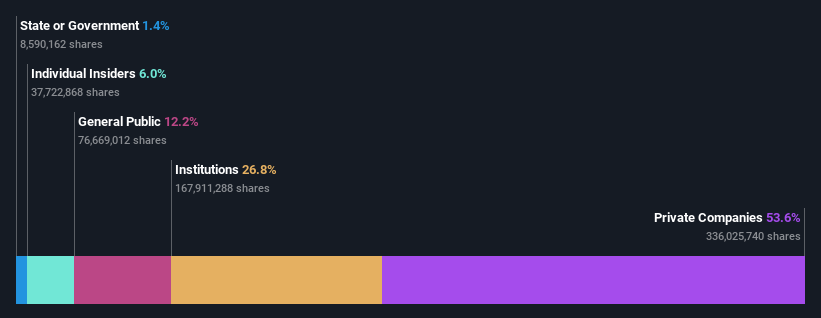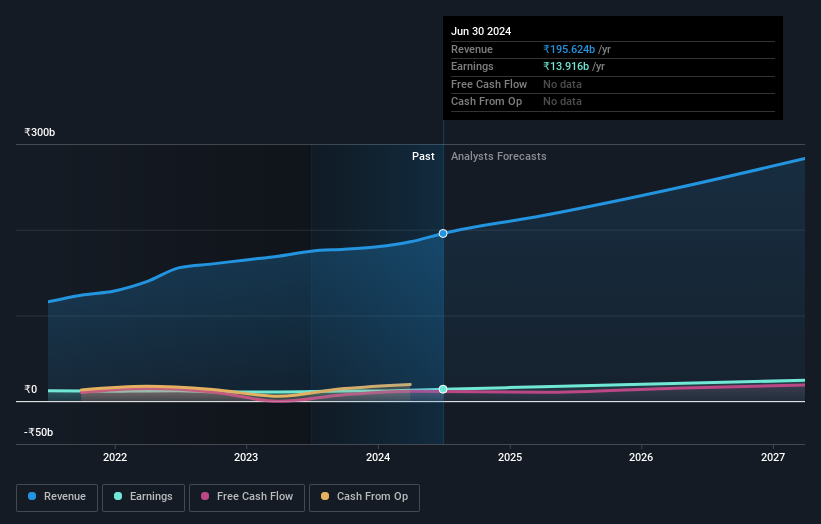- India
- /
- Electrical
- /
- NSEI:HAVELLS
Institutions profited after Havells India Limited's (NSE:HAVELLS) market cap rose ₹47b last week but private companies profited the most

Key Insights
- The considerable ownership by private companies in Havells India indicates that they collectively have a greater say in management and business strategy
- The top 2 shareholders own 54% of the company
- Institutional ownership in Havells India is 27%
To get a sense of who is truly in control of Havells India Limited (NSE:HAVELLS), it is important to understand the ownership structure of the business. The group holding the most number of shares in the company, around 54% to be precise, is private companies. That is, the group stands to benefit the most if the stock rises (or lose the most if there is a downturn).
Following a 4.0% increase in the stock price last week, private companies profited the most, but institutions who own 27% stock also stood to gain from the increase.
In the chart below, we zoom in on the different ownership groups of Havells India.
View our latest analysis for Havells India

What Does The Institutional Ownership Tell Us About Havells India?
Many institutions measure their performance against an index that approximates the local market. So they usually pay more attention to companies that are included in major indices.
Havells India already has institutions on the share registry. Indeed, they own a respectable stake in the company. This implies the analysts working for those institutions have looked at the stock and they like it. But just like anyone else, they could be wrong. If multiple institutions change their view on a stock at the same time, you could see the share price drop fast. It's therefore worth looking at Havells India's earnings history below. Of course, the future is what really matters.

Havells India is not owned by hedge funds. Looking at our data, we can see that the largest shareholder is QRG Investments and Holdings Limited with 41% of shares outstanding. Arg Family Trust is the second largest shareholder owning 12% of common stock, and Surjit Gupta holds about 5.8% of the company stock. Surjit Gupta, who is the third-largest shareholder, also happens to hold the title of Member of the Board of Directors.
A more detailed study of the shareholder registry showed us that 2 of the top shareholders have a considerable amount of ownership in the company, via their 54% stake.
Researching institutional ownership is a good way to gauge and filter a stock's expected performance. The same can be achieved by studying analyst sentiments. There are a reasonable number of analysts covering the stock, so it might be useful to find out their aggregate view on the future.
Insider Ownership Of Havells India
While the precise definition of an insider can be subjective, almost everyone considers board members to be insiders. Company management run the business, but the CEO will answer to the board, even if he or she is a member of it.
Most consider insider ownership a positive because it can indicate the board is well aligned with other shareholders. However, on some occasions too much power is concentrated within this group.
Shareholders would probably be interested to learn that insiders own shares in Havells India Limited. It is a very large company, and board members collectively own ₹72b worth of shares (at current prices). Most would say this shows a good alignment of interests between shareholders and the board. Still, it might be worth checking if those insiders have been selling.
General Public Ownership
The general public, who are usually individual investors, hold a 12% stake in Havells India. This size of ownership, while considerable, may not be enough to change company policy if the decision is not in sync with other large shareholders.
Private Company Ownership
Our data indicates that Private Companies hold 54%, of the company's shares. It might be worth looking deeper into this. If related parties, such as insiders, have an interest in one of these private companies, that should be disclosed in the annual report. Private companies may also have a strategic interest in the company.
Next Steps:
It's always worth thinking about the different groups who own shares in a company. But to understand Havells India better, we need to consider many other factors. Be aware that Havells India is showing 1 warning sign in our investment analysis , you should know about...
Ultimately the future is most important. You can access this free report on analyst forecasts for the company.
NB: Figures in this article are calculated using data from the last twelve months, which refer to the 12-month period ending on the last date of the month the financial statement is dated. This may not be consistent with full year annual report figures.
Valuation is complex, but we're here to simplify it.
Discover if Havells India might be undervalued or overvalued with our detailed analysis, featuring fair value estimates, potential risks, dividends, insider trades, and its financial condition.
Access Free AnalysisHave feedback on this article? Concerned about the content? Get in touch with us directly. Alternatively, email editorial-team (at) simplywallst.com.
This article by Simply Wall St is general in nature. We provide commentary based on historical data and analyst forecasts only using an unbiased methodology and our articles are not intended to be financial advice. It does not constitute a recommendation to buy or sell any stock, and does not take account of your objectives, or your financial situation. We aim to bring you long-term focused analysis driven by fundamental data. Note that our analysis may not factor in the latest price-sensitive company announcements or qualitative material. Simply Wall St has no position in any stocks mentioned.
About NSEI:HAVELLS
Havells India
A fast-moving electrical goods company, manufactures, trades in, and sells various consumer electrical and electronic products in India and internationally.
Excellent balance sheet with reasonable growth potential and pays a dividend.
Market Insights
Community Narratives




